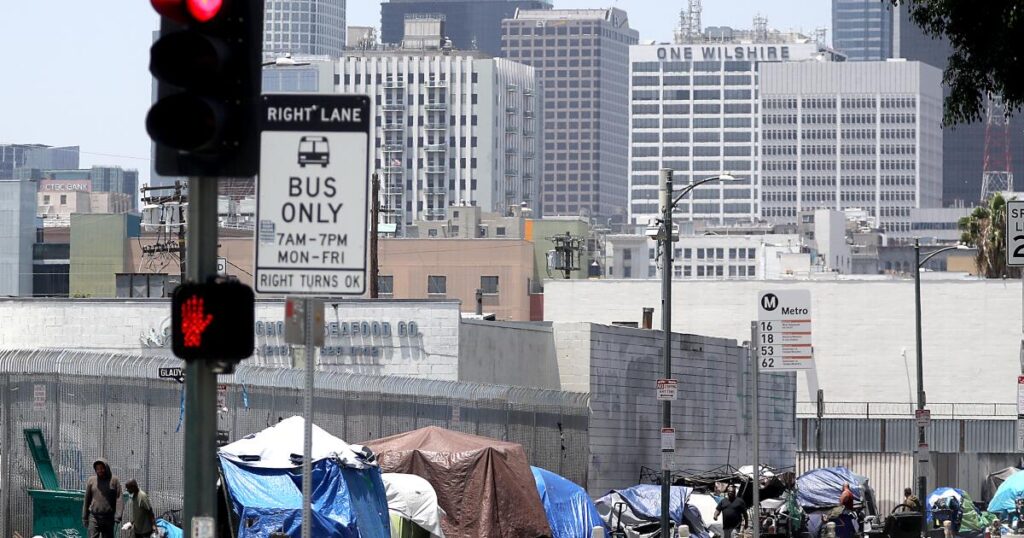
California and Western cities can enforce laws restricting homeless encampments on sidewalks and other public property, the Supreme Court ruled Friday.
In a 6-3 ruling, the justices disagreed with the Ninth Circuit Court of Appeals for San Francisco and ruled that city officials’ banning homeless people from sleeping on the streets or in parks was not “cruel and unusual” punishment.
“Homelessness is complex,” Judge Neil M. Gorsuch wrote in the court. “The causes are many. So may the public policy responses needed to address the problem. Ultimately, the question raised by this case is whether the Eighth Amendment gives federal judges the primary responsibility to evaluate those causes and formulate those responses. It is not .
Gorsuch said the Eighth Amendment “does not authorize federal judges to take these rights and responsibilities away from the American people and leave it to them to determine homelessness policy in this country.”
Other conservative justices also sided with him, while three liberal justices dissented.
“Sleep is a biological necessity, not a crime,” Justice Sonia Sotomayor said in dissent. “For some people, sleeping outside is their only option. For people who can’t get shelter, it’s punishment for being homeless. It’s unreasonable and unconstitutional. Under the Eighth Amendment , punishing others because of their status is “cruel and unusual.”
The ruling is a major victory for Western city officials and a setback for homeless rights advocates. Since 2018, they have won a Ninth Circuit ruling that it is unconstitutional to enforce anti-camping laws against people who are homeless and have nowhere to sleep.
City officials say the rulings have led to an increase in tent encampments in Los Angeles and most cities on the West Coast. They jointly appealed to the Supreme Court, seeking clarification of their powers over public property.
Today’s decision does not require cities or police to take stronger enforcement actions against homeless people, but it will allow some of them to do so.
The case before the court occurred in Grants Pass, Oregon, a city of 38,000 people. An estimated 50 to 600 people are homeless, with only a few shelters lacking space to accommodate them all.
Homeless advocates said city police fined and threatened people living on sidewalks or in cars. They said the city’s goal was to “evict” the homeless people from the town.
They sued and won before a federal judge, who struck down the anti-camping ordinance because the city was essentially punishing homeless people.
A divided Ninth Circuit agreed with the decision in a 2-1 vote. Judge Roseanne Silver said, “Under the Eighth Amendment, the city of Grants Pass cannot deny homeless people a right to deny their rights simply because homeless people sleep outdoors without basic weather protection, or sleep in their cars at night. Just enforce anti-camping ordinances on them, when there’s nowhere else in town for them to go.
The full Ninth Circuit later upheld the ruling, 14-13.
Two dozen government and business groups, including California Gov. Gavin Newsom and city attorneys from Los Angeles, San Francisco, San Diego and Phoenix, urged the high court to hear an appeal of Johnson v. Grants Pass and overturn the Ninth Circuit.
Prior to this, 40 years ago, the Supreme Court had heard only one case related to homelessness.
In 1982, a group called Communities for Creative Nonviolence sought permission to hold a homeless awareness demonstration in Lafayette Square, across the street from the White House. Their demands included building a “sleep” for about 50 people. A symbolic tent city”.
The National Park Service granted a permit for the demonstration but denied a request to sleep in the park. Supporters filed a lawsuit arguing that the camping ban violated First Amendment protections of free speech. They lost before a federal judge, won in the U.S. Court of Appeals, and ultimately lost 7-2 in 1984 at the Supreme Court.
Judge Byron White wrote in court that the First Amendment allows for reasonable restrictions on the “time, place and manner” of demonstrations. “We have no difficulty in concluding that the Park Service may prohibit overnight stays at the park in question,” he wrote.

